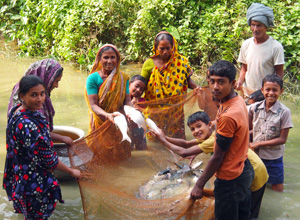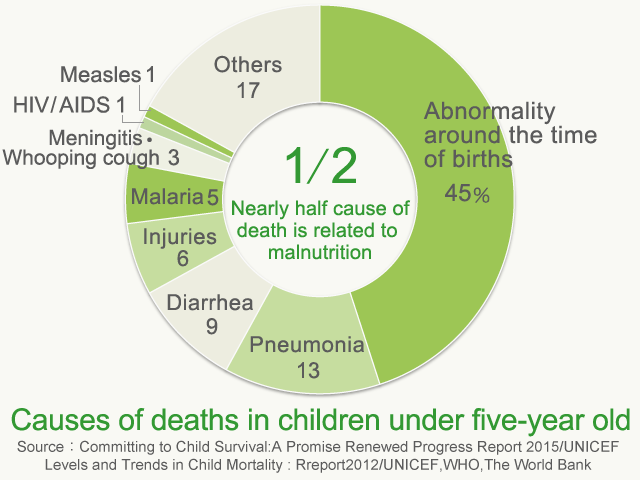Hunger is chronic malnutrition
The global hunger population is 815 million. One person out of nine is suffering from hunger
- Hunger is defined as a state in which a person does not have access to enough food for a long period being undernourished, and has difficulties in supporting life or making a living
- The baseline is not only to maintain life but to perform healthy and social activities
- The “quality” of food such as nutrient is important as well as calorie intake
Hunger is a state in which a person does not have access to food for a long period, resulting in undernourishment, and has difficulties in existing and leading a social life. The Food and Agriculture Organization of the United Nations (FAO) defines undernourishment as “a person is not able to acquire enough food to meet the daily minimum dietary energy requirements to lead a healthy and active life”. The minimum dietary energy is determined by the individual’s age, physical constitutions, as well as activity level, whether the person is in poor health or not, whether a woman is pregnant or breastfeeding etc.
Further, even if the quantity of food intake is enough, lack of micronutrients and vitamins such as Vitamin A, iron, and iodine, can cause various diseases and damage the normal functions of body and mind because they are indispensable for maintenance of life. For instance, shortage of iron causes anemia, affecting the health of women in and after pregnancy or development of infants. Lack of iodine can result in thyroid disorder.

Sudden famine and chronic hunger
- Sudden famine is a state in which many people suffer undernourishment due to temporary shortage of food. Emergency food aid is necessary
- Chronic hunger is a state in which people are chronically undernourished because they do not have regular access to food. Assistance for self-reliance is necessary
Hunger can be roughly classified into two categories, famine and chronic hunger, depending on its geographical location, its causes, or its duration. Famines are caused by unexpected incidents in a specific country or region such as conflicts or natural disasters including droughts and floods. Food supply falls drastically short and many people starve to death or suffer from serious malnutrition. Emergency food aid is necessary for a certain period until the cause is alleviated or resolved while intense news coverage attracts global attention to them.
On the other hand, chronic hunger attracts relatively less attention in spite that it makes up most of the undernourished population worldwide. It is caused not only by regional problems such as low agricultural productivity, or low wages paid to employees but also by global problems such as unfair trade systems. It is regarded less urgent and its solution tends to be left behind. This is not only because it involves various factors such as politics, education and environments in complicated manners but also the direct cause of their death is diseases from malnutrition, not by starvation itself. Consequently, a huge population stays undernourished indefinitely because they have no access to sufficient food. What is necessary is to assist them to be self-reliant so that they would be able to acquire food on their own sustainably and to solve the fundamental problems.

The impact caused by hunger
About half of the cause of deaths of children under five years old around the world is related to malnutrition
Malnutrition can affect people’s lives throughout their lifetime
Those who are most vulnerable to the influence of hunger are poor people of developing countries. Particularly, its influence on children during their growth period is serious.
Analysis of the causes of deaths of children under five years old around the world shows that about half is caused by diseases that can be easily cured with low-cost medication such as pneumonia or diarrhea. These diseases are related to malnutrition, or poor health due to shortage of nutrition or nutrients. This means many lives in the world that could be saved are being lost due to hunger. Even if they survive the hunger, their development might not be enough to work efficiently when they become adults or they might suffer from intellectual disabilities because malnutrition inhibits children’s normal growth. It is important that women, who could get pregnant and give births, acquire sufficient nutrition, for it can have significant impact on the growth and future development of newborn babies.
Thus, hunger is a serious problem that can affect people’s lives throughout their lifetime.

